In memoriam: Professor Igor Dawid (1935-2024)
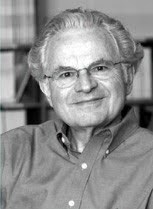
Professor Emeritus Igor Dawid, renowned developmental biologist, passed away on Tuesday, February 13, 2024. He was 88.
Igor was a key pioneer and champion of modern Xenopus research, and co-founder of the international Xenopus conferences over 40 years ago. He was a generous friend and mentor to all who knew him. Our thoughts are with his wife, Dr. Keiko Ozato, the Dawid family, his friends and many colleagues.
Over his career, Dr. Dawid authored more than 290 publications. He served as Editor-in-Chief of Developmental Biology, Chair of the Board for the Proceedings of the National Academy of Sciences, and on numerous advisory committees. His outstanding achievements were honored with election to the National Academy of Sciences and the American Academy of Arts and Sciences, the Lifetime Achievement Award of the Society for Developmental Biology, and honorary doctoral degrees from Lausanne University, Switzerland and the Technion, Israel. Dr. Dawid’s close associates recall that he was an experimentalist at heart who loved to be at the lab bench.
Please visit the Hines-Rinadi Funeral Home website to send flowers, add a memory of Igor: https://www.dignitymemorial.com/obituaries/silver-spring-md/igor-dawid-11667829
A remembrance from Professor Sally Moody.
Igor is well acknowledged by numerous awards and accolades for his many scientific contributions. But in addition, he also should be recognized as a strong supporter of advancing the impact of the Xenopus research community. I first met Igor in 1984 as a brand new Assistant Professor with no connections to the broader Xenopus community. He and John Gurdon (not yet “Sir”) brought together about 25 researchers from the UK and US for a few days at Airlie House in Warrington, Virginia to give research updates and discuss whether there was sufficient interest to begin a biannual international conference. Thus was born the long-standing International Xenopus Conference, the first meeting of which was in April 1986 at the University of East Anglia, UK, organized and financed by Igor and John. That dynamic duo were committed to making sure the IXC continued for decades before transferring its oversight to the next generation.
My invitation to participate in the Airlie House meeting, probably based only on my proximity as a new faculty member at the University of Virginia, was my introduction to the Xenopus “molecular development” community. This began long-serving friendships and collaborations. A few years later when I moved to the Washington area, Igor welcomed me to the local developmental biology community as part of the monthly Zebrafish and Frog Interest Group (ZFIG) his laboratory had organized at the National Institute of Child Health and Human Development (NICHD). I cannot count the number of cDNA plasmids, techniques and collaborations that I acquired through these interactions. I could email Igor for a cDNA in the morning and go pick it up by Metro that afternoon. His group was my personal Addgene, for which I am eternally grateful.
I was not the only beneficiary of Igor’s generosity of resources; it extended to the entire Xenopus community. Beside organizing the IXC, he was influential behind the scenes for the creation of Xenbase, the Xenopus and zebrafish Affymetrix microarrays (remember those?), and the libraries that were the sources for the many thousands of EST and cDNA sequences that guided our research prior to genome sequencing. Igor enthusiastically advocated for Xenopus research whenever the NICHD leadership asked for input on investment, thus having a major impact on funding decisions.
I remember Igor with great respect and affection not only for his impressive scientific contributions, his many impressive trainees, and his generosity to my research efforts, but also for his unwavering gift of time, resources and commitment to the Xenopus community.
The academic history of an acclaimed scientist.
From Dr. Chris J. McBain, Scientific Director, NICHD, NIH
Dr. Igor Dawid. Dr. Dawid headed the Section on Developmental Biology, NICHD from 1982 until his retirement in December 2016, transitioning to an NICHD Scientist Emeritus after his retirement.
He served as chief of the NICHD’s Laboratory of Molecular Genetics from 1982-2010, head of the Program in Genomics of Differentiation from 2007-2010, and acting scientific director of NICHD from 1998-2000.
Dr. Dawid received his Ph.D. from the University of Vienna and completed his postdoctoral training at the Massachusetts Institute of Technology before taking a position with the Carnegie Institution of Washington in Baltimore, MD, in the Department of Embryology. He arrived at NIH in 1978, working first with the National Cancer Institute before moving to NICHD in 1982.
In his career spanning more than five decades, Dr. Dawid studied molecular mechanisms of development, using frog (Xenopus laevis) and zebrafish (Danio rerio) as model systems. During this time, he made several important contributions to the field including some of the first molecular evidence for maternal inheritance of mitochondrial DNA in animals, co-discovering amplification of ribosomal genes in frog oocytes, being a leader in the study of differential gene expression in embryogenesis, illuminating the role of Lhx genes and the Wnt pathway in axis determination, and contributing to the elucidation of additional pathways regulating vertebrate development.
See his bio under Scientists Emeriti at: https://www.nichd.nih.gov/about/org/dir/scientists-emeriti
Remembrance: photos and captions shared by Professor Koichiro Shiokawa.
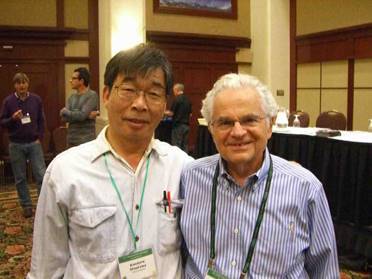
At Calgary conference.
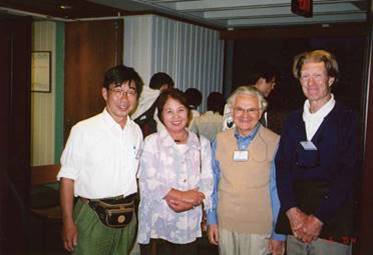
At Woods Hole Xenopus conference.
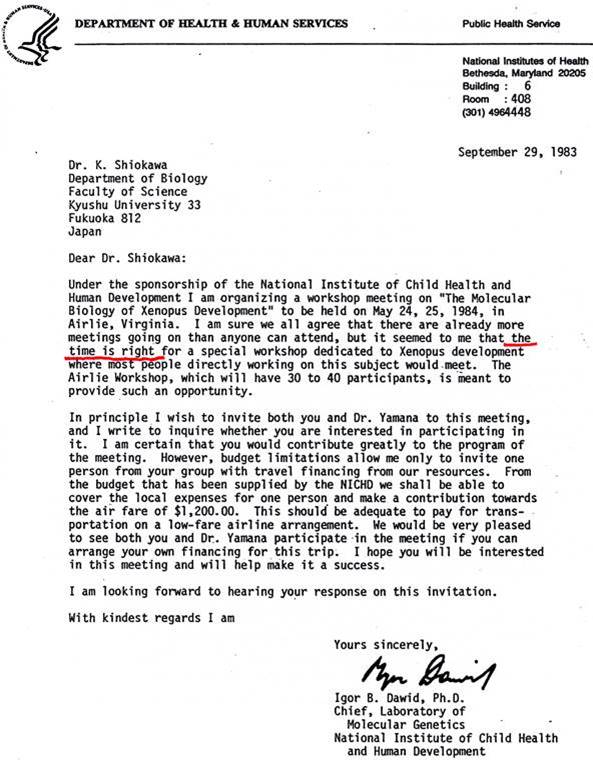
The letter about Airlie House Conference in 1984.
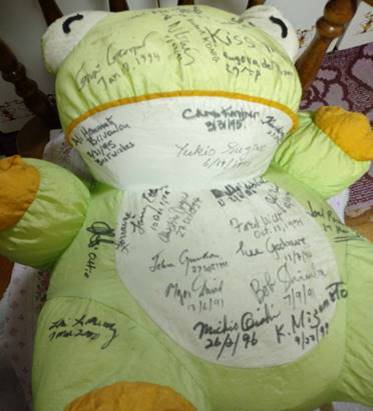
Igor and John Gurdon’s signature.
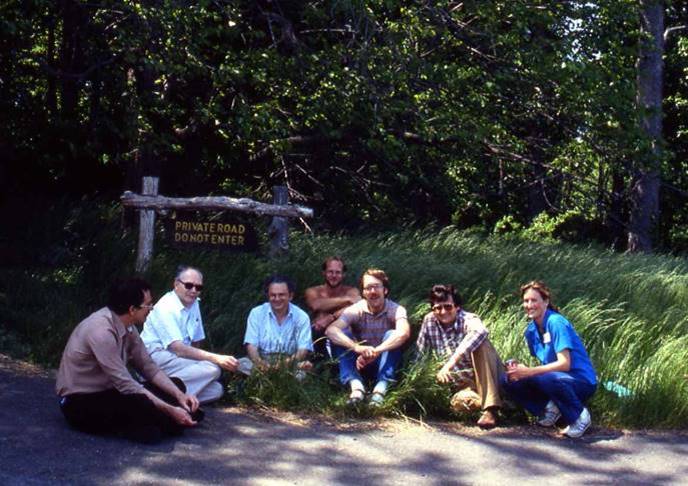
Airlie house, 1984.
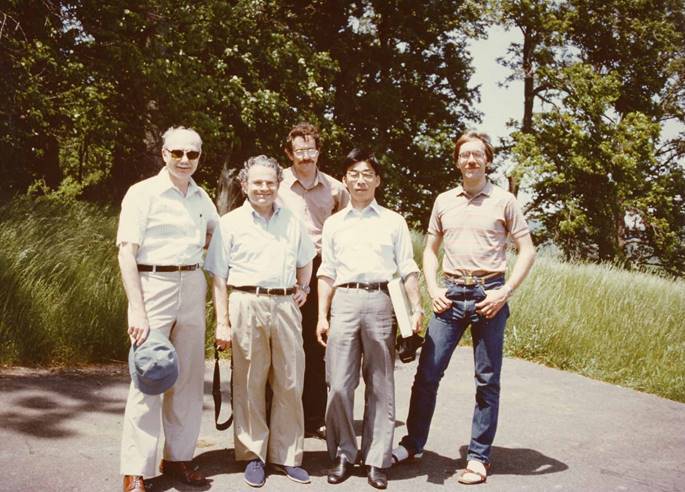
Airlie house, 1984.
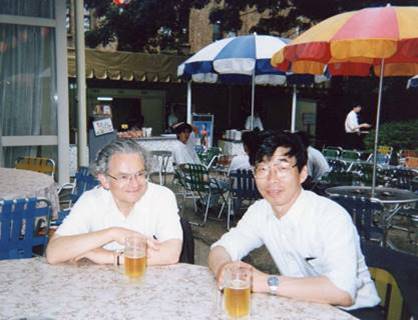
Tokyo University, after seminar, 1991.
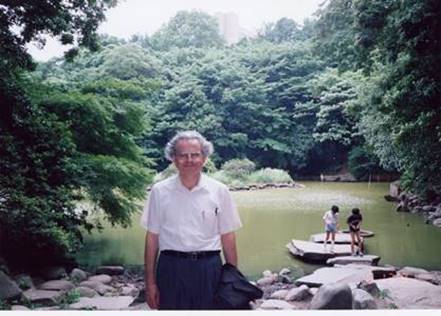
Tokyo University, Sanshiro pond, 1991.
Last Updated: 2024-02-21